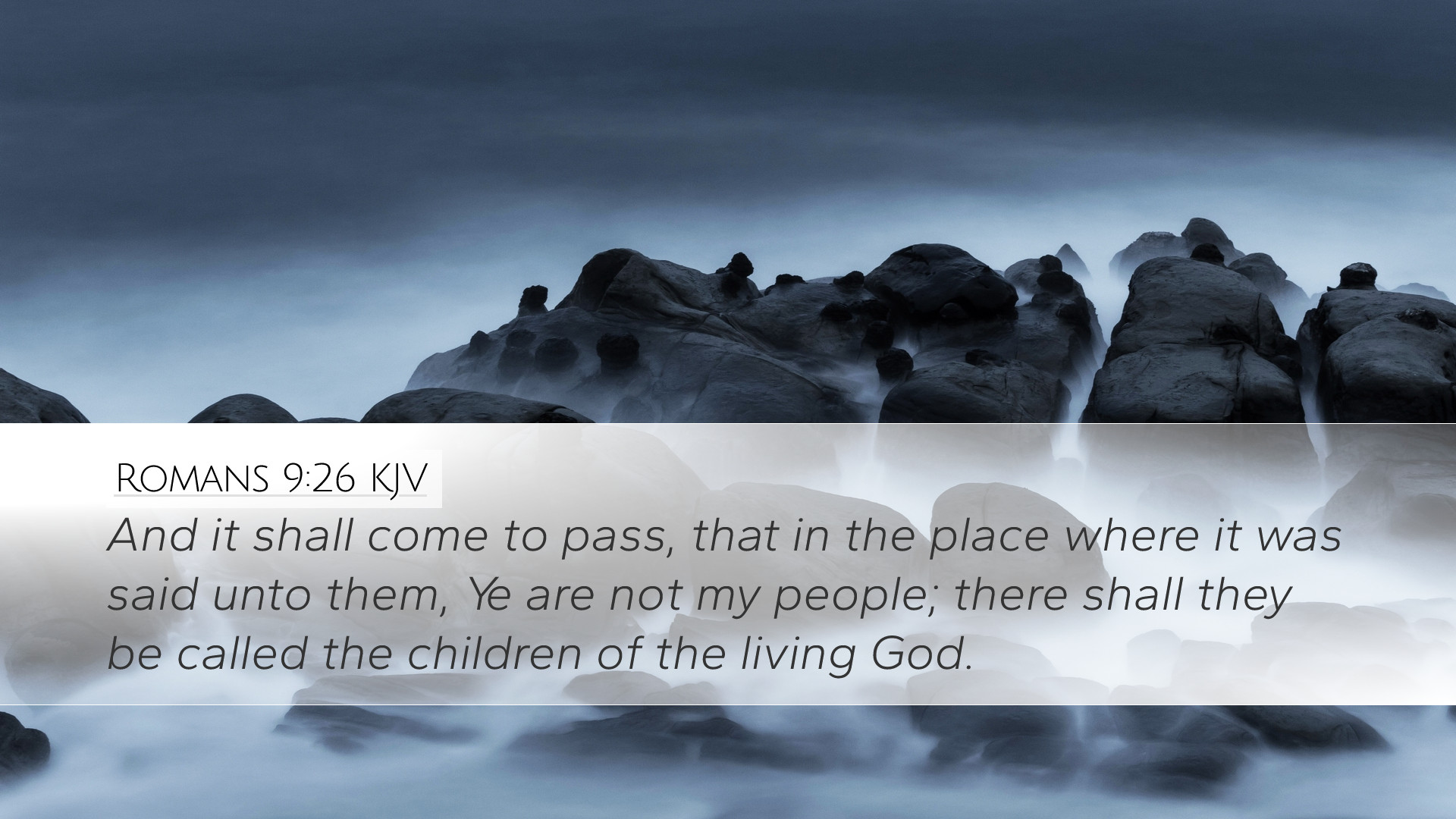Commentary on Romans 9:26
Verse Text: "And it shall come to pass, that in the place where it was said unto them, Ye are not my people; there shall they be called the children of the living God."
Introduction
This verse is a profound declaration concerning God's inclusive grace and the restoration of Israel. In Romans 9:26, the Apostle Paul draws upon the prophetic words of Hosea, emphasizing the transition from rejection to acceptance among the Gentiles and the remnants of Israel. This commentary integrates insights from Matthew Henry, Albert Barnes, and Adam Clarke, addressing the theological implications, historical context, and pastoral applications of this significant verse.
Context and Historical Background
Romans chapters 9 through 11 deal extensively with the state of Israel in light of the Gospel. Paul grappled with the painful reality of Israel’s rejection of Christ and the consequent inclusion of the Gentiles into God’s redemptive plan. The quotations from the Old Testament underscore God’s covenant faithfulness and His patience in extending mercy even to those who were once deemed unworthy.
Matthew Henry's Insights
Henry emphasizes the richness of God's mercy towards those who were 'not my people.' He notes that this phrase signifies both a literal rejection and the broader spiritual reality of separation from God. The essence of Paul's argument here is not just about ethnicity but rather the identity found in Christ. Henry affirms that God's ability to call people out of darkness into His marvelous light is a testimony to His sovereign grace:
- Inclusion of Gentiles: The verse prophesies a day when those outside of Israel will be transformed and identified as children of God, signifying the breaking down of barriers between Jew and Gentile.
- Divine Sovereignty: Henry stresses that it is God who defines His people and it is by His grace that anyone can be called a child of the living God, irrespective of their past.
Albert Barnes' Perspective
Barnes provides a detailed linguistic analysis of the verse, tying it back to the prophetic literature which asserts God’s promise of restoration:
- Metaphorical Language: The phrase 'not my people' resonates with the language in Hosea, symbolizing a ruptured relationship. However, the transformative promise indicates that the same group, once estranged, shall experience a profound reconciliation.
- Theological Implications: Barnes points out the essential doctrine of regeneration and the transformative role of the Holy Spirit. Those who accept Christ become 'children of the living God,' highlighting the intimate relationship believers have with God.
Adam Clarke's Exegesis
Clarke’s commentary delves into the implications of the terms used by Paul. He draws attention to the covenantal language that is prevalent throughout Scripture:
- Covenantal Fulfillment: Clarke interprets Paul’s words as a fulfillment of God’s promises that extend beyond ethnic Israel to all who believe, establishing a new covenant community.
- Living God: The reference to the 'living God' underscores the dynamic and active nature of God in the lives of believers. Clarke elucidates that this phrase invites a relationship characterized by life, activity, and responsiveness.
Theological Themes
Inclusivity of God’s Grace
This verse epitomizes the theme of God’s grace that is inclusive of all people. It reflects the essence of the Gospel which transcends cultural and ethnic boundaries. Paul reassures the reader that irrespective of their past, anyone can attain sonship through faith in Christ.
Rejection and Restoration
Another vital theme is the juxtaposition of rejection and restoration. This serves not only as a historical commentary on Israel’s trajectory but also as an encouragement for believers today. It assures them that despite their failures, God’s redemptive work is always at hand, providing hope for restoration and belonging.
Identity in Christ
Believers are reminded of their new identity in Christ. The acceptance of the Gentiles and the remnant of Israel as God’s children affirms that identity is not solely defined by heritage or works, but by the grace extended through faith in Jesus Christ.
Pastoral Applications
Encouragement for the Marginalized
This passage offers deep encouragement to those who feel unworthy or overlooked. It speaks to the heart of ministry, where pastors can emphasize that, like the Gentiles who were once distant, everyone has the opportunity to experience God’s transformative love and acceptance.
Affirmation of Believers' Identity
For students and leaders in the church, understanding this verse is essential for teaching the congregation about their identity in Christ. It is vital to affirm that all who place their faith in Christ are indeed children of the living God, encouraging church life built on community and acceptance.
Emphasis on Evangelism
This verse holds implications for the call to evangelism. The Church is tasked with sharing the message of inclusion, underscoring that God calls all to Himself. Pastors and theologians must communicate that God’s grace is available not just to a select few but to everyone who believes.
Conclusion
Romans 9:26 is a profound testament to the nature of God’s grace. Drawing from the works of Henry, Barnes, and Clarke, we recognize the multi-faceted implications of this verse: the inclusion of the Gentiles, the faithful character of God, and the assured identity of believers as children of the living God. As we contemplate these insights, may we be driven by a deeper understanding of God’s heart for all humanity and empowered to live out our identity with confidence and grace.


